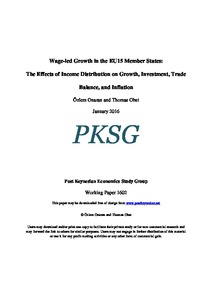Wage-led growth in the EU15 member states: The effects of income distribution on growth, investment, trade balance, and inflation
"This paper estimates a multi-country demand-led growth model for EU15 countries. A decrease in the share of wages in national income in isolation leads to lower growth in Finland, France, Germany, Greece, Italy, Luxembourg, Netherlands, Portugal, Spain, Sweden and the United Kingdom, whereas i...
| Main Authors: | , , |
|---|---|
| Institution: | ETUI-European Trade Union Institute |
| Format: | TEXT |
| Language: | English |
| Published: |
Durham
2016
PKSG |
| Subjects: | |
| Online Access: | https://www.labourline.org/KENTIKA-19106476124919246589-Wage-led-growth-in-the-eu15-me.htm |
| Summary: | "This paper estimates a multi-country demand-led growth model for EU15 countries. A decrease in the share of wages in national income in isolation leads to lower growth in Finland, France, Germany, Greece, Italy, Luxembourg, Netherlands, Portugal, Spain, Sweden and the United Kingdom, whereas it stimulates growth in Austria, Belgium, Denmark and Ireland. However, a simultaneous decline in the wage share leads to an overall decline in EU15 GDP; hence EU15 as a whole is a wage-led economy. Furthermore, Austria and Ireland also experience negative effects on growth when they decrease their wage share along with their trading partners. The results indicate that a decline in the wage share has had significant negative effects on growth in the EU15 countries and supports the case of wage coordination. We present different wage-led recovery scenarios taking into account further effects of a change in the wage share on prices, nominal unit labour costs, investment, and net exports." |
|---|---|
| Physical Description: | 41 p. Digital |

